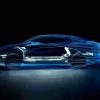 The BMW iX5 Hydrogen runs on odorless gas and only emits water vapor as a result
The BMW iX5 Hydrogen runs on odorless gas and only emits water vapor as a result
Outside the country road and outside the gate near Heathrow Airport B the airport has one of the few hydrogen filling stations in the UK.
There are familiar canopies, pumps, no smoking signs and other trappings, but there is no gas station smell or stain as there is enough fuel to drive hundreds miles, is released in less than four minutes as a clear, odorless gas.
BMW is banking on the technology as it seeks to find an alternative to battery-powered electric vehicles as it fights to topple Elon Musk's Tesla in the battle for the future of driving.
The German automaker believes hydrogen cars can help four large groups of drivers who are unlikely to switch to electric traction.
He intends to sell them to customers who don't have home charging, such as those who don't have a garage or driveway; drivers who require high flexibility or frequent trips for whom even fast charging takes too long; buyers in cold climates, which kills battery life; and those who tow heavy loads.
Cars drive like electric cars because their fuel cells burn hydrogen, which produces only water, to generate electricity that powers the engine. Fill them with solar- or wind-powered hydrogen and they'll be as green as a battery-powered car.
To test the concept, BMW equipped a small test fleet of X5 SUVs with a 170-horsepower hydrogen powerplant.
BMW vs Tesla
It is paired with a small battery that harvests energy from braking and delivers hybrid-like acceleration. petrol car. Together, they can develop over 400 horsepower and accelerate from standstill to 100 km/h in six seconds.
BMW and Toyota are among the minority of major automakers seeking to use the technology as an industry option. struggling to find an answer to Musk.
On Sunday evening, Tesla once again proved its leadership in the electric vehicle arena, reporting a record number of deliveries in the second quarter of 2023.
The automaker handed over 466,000 vehicles in the three months to June, including price. the cuts paid off, beating analysts' expectations of 445,000 deliveries.
As a result, Wall Street stock rose 6.9 percent and the business is valued at $877bn (£691bn), more than the next nine companies combined.
European competitors remain. playing catch-up, and BMW sees hydrogen as a useful way to stand out.
“Putting all your eggs in one basket is the wrong thing to do,” says Jurgen Guldner, general manager of the hydrogen program at BMW.
He also hopes that a company like his can stimulate demand for gas. .
“The transportation sector can pay a higher price for hydrogen as a fuel to replace diesel than, for example, a steel plant,” he says.
“This steel plant replaces coal or gas. So the transport sector can actually be the catalyst for starting a hydrogen economy because they can pay a higher price at the start, plus the amount of hydrogen needed for the transport sector, compared to what heavy industry needs, is less.”
0604 Tesla BoomOthers are also showing interest, albeit with a degree of skepticism.
Last year, Volkswagen filed a patent for a new hydrogen fuel cell system with a range of 1,243 miles, using cheaper ceramic components compared to the polymers used by Toyota and Hyundai.
But in February Volkswagen brand chief Thomas Schafer said that hydrogen will not be a viable option for at least the next decade.
Ford and Stellantis, which own brands from Vauxhall to Citroen, have focused their efforts on hydrogen. on vans as an alternative to diesel, and for most automakers, gas is seen as a good choice for heavier vehicles such as vans, trucks and heavy vehicles.
While hydrogen cars seem like the perfect solution for caravan owners, sales reps and city dwellers to be carbon-free, they must use gas derived from renewable electricity, using current to split water molecules into hydrogen and oxygen.
This extra step means the fuel will always be more expensive than the electricity itself, which can be used to directly charge the car's battery.
A 6kg X5 hydrogen tank costs around £120. fill, offering a range of around 310 miles at today's price of around 39p per mile.
It also puts drivers in competition with industries that have few other options, especially in the short term as green hydrogen is expensive to produce and has very limited capacity to date.
0409 UK Hydrogen Demand Forecast
Steel , cement and glass Manufacturers and the aviation industry are demanding gas because batteries and electricity are either too heavy or do not produce the required heat.
Sabine Klauke, Airbus' technical director, said in an interview last month. that industries that can use batteries must do so, leaving limited supplies of raw materials for those who have no alternative.
In an interview at the Paris Air Show, she said: “There are industries that are really difficult to decarburize.
p>
“Therefore, it would be much more useful if those who can work on electricity worked on electricity.”
Others are more optimistic. Blake Scholl, founder of supersonic jet developer Boom Supersonic, is confident that the huge demand for clean jet fuel and the hydrogen from which it is produced will lead to an explosion in production.
He said at a press conference last month: “Over time, as supply increases to catch up with demand, prices will fall. It happens in every market.»
 If hydrogen is to play a more important role in British transport, access to fuel will be required. improve a dozen existing stations today. Photo: ED ROBINSON
If hydrogen is to play a more important role in British transport, access to fuel will be required. improve a dozen existing stations today. Photo: ED ROBINSON
Hydrogen production can absorb excess green energy produced on windy sunny days, which can then be used later, offloading an electricity grid that already needs billions of pounds of upgrades to cope with looming demand for millions of electric vehicles. heat pumps. and greener industrial processes.
Unlike sunlight, it can be stored and transported over the UK's natural gas network, which already exists and is being upgraded to use the fuel.
Gas can also be imported from areas with strong wind or sunshine, such as the UK or Saudi Arabia, offering exports to these countries.
BMW's Guldner was wary when asked how much his hydrogen-powered car would cost, but admitted it would need to be competitive with electric options.
Fuel cells are getting cheaper, and new models need the same amount. platinum as a typical catalytic converter, which will help keep costs down.
Claire Jackson, chief executive of Hydrogen UK, says the industry is keen to work with everyone.
«In accordance with government With low-carbon hydrogen production targets set for 2030, Hydrogen UK is calling on both aviation and road transport to decarbonize the use of hydrogen,” she says.
Only 5% of the hydrogen produced in seven years will be needed to jet fuel, she says, with 7,500 trucks running will consume another 1.6%, leaving more than 90% for other industries.
The UK needs to catch up. With fewer than a dozen gas stations, it will take a lot of discoveries to convince motorists to use this fuel.
And for BMW, defeating Musk with a hydrogen-powered car still seems like a very distant dream.
























































Свежие комментарии